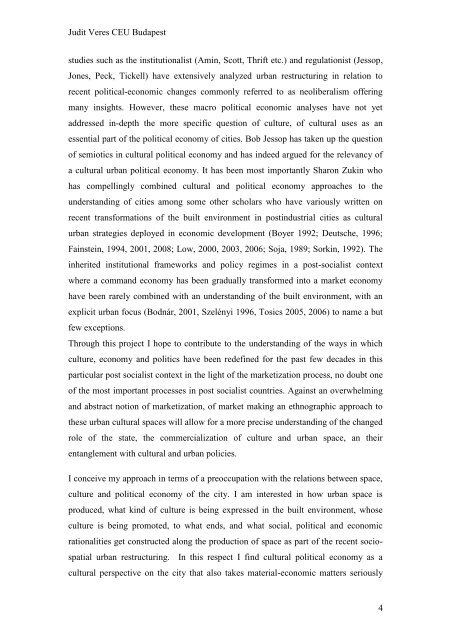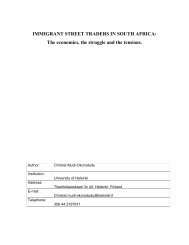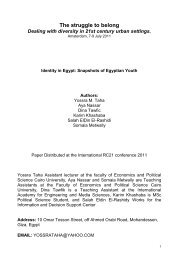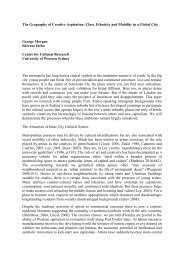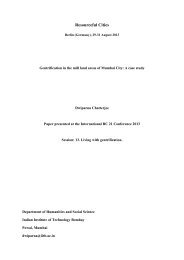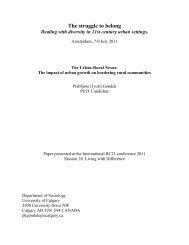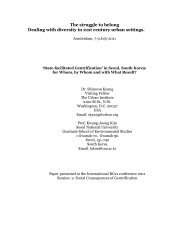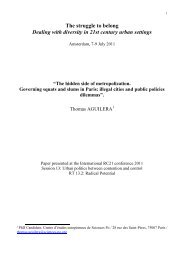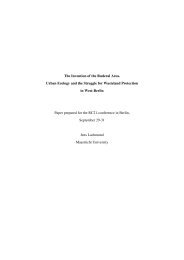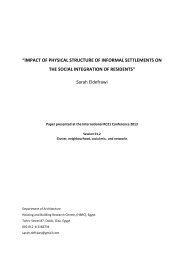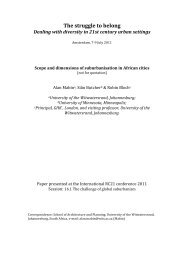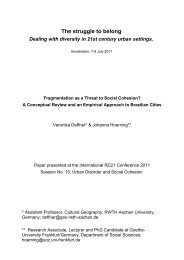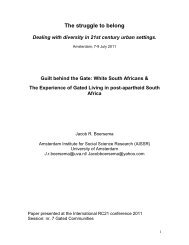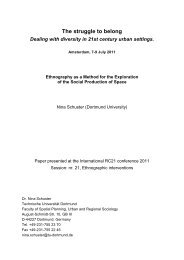Gentrification as a broad process of reurbanization - RC21 ORG ...
Gentrification as a broad process of reurbanization - RC21 ORG ...
Gentrification as a broad process of reurbanization - RC21 ORG ...
You also want an ePaper? Increase the reach of your titles
YUMPU automatically turns print PDFs into web optimized ePapers that Google loves.
Judit Veres CEU Budapest<br />
studies such <strong>as</strong> the institutionalist (Amin, Scott, Thrift etc.) and regulationist (Jessop,<br />
Jones, Peck, Tickell) have extensively analyzed urban restructuring in relation to<br />
recent political-economic changes commonly referred to <strong>as</strong> neoliberalism <strong>of</strong>fering<br />
many insights. However, these macro political economic analyses have not yet<br />
addressed in-depth the more specific question <strong>of</strong> culture, <strong>of</strong> cultural uses <strong>as</strong> an<br />
essential part <strong>of</strong> the political economy <strong>of</strong> cities. Bob Jessop h<strong>as</strong> taken up the question<br />
<strong>of</strong> semiotics in cultural political economy and h<strong>as</strong> indeed argued for the relevancy <strong>of</strong><br />
a cultural urban political economy. It h<strong>as</strong> been most importantly Sharon Zukin who<br />
h<strong>as</strong> compellingly combined cultural and political economy approaches to the<br />
understanding <strong>of</strong> cities among some other scholars who have variously written on<br />
recent transformations <strong>of</strong> the built environment in postindustrial cities <strong>as</strong> cultural<br />
urban strategies deployed in economic development (Boyer 1992; Deutsche, 1996;<br />
Fainstein, 1994, 2001, 2008; Low, 2000, 2003, 2006; Soja, 1989; Sorkin, 1992). The<br />
inherited institutional frameworks and policy regimes in a post-socialist context<br />
where a command economy h<strong>as</strong> been gradually transformed into a market economy<br />
have been rarely combined with an understanding <strong>of</strong> the built environment, with an<br />
explicit urban focus (Bodnár, 2001, Szelényi 1996, Tosics 2005, 2006) to name a but<br />
few exceptions.<br />
Through this project I hope to contribute to the understanding <strong>of</strong> the ways in which<br />
culture, economy and politics have been redefined for the p<strong>as</strong>t few decades in this<br />
particular post socialist context in the light <strong>of</strong> the marketization <strong>process</strong>, no doubt one<br />
<strong>of</strong> the most important <strong>process</strong>es in post socialist countries. Against an overwhelming<br />
and abstract notion <strong>of</strong> marketization, <strong>of</strong> market making an ethnographic approach to<br />
these urban cultural spaces will allow for a more precise understanding <strong>of</strong> the changed<br />
role <strong>of</strong> the state, the commercialization <strong>of</strong> culture and urban space, an their<br />
entanglement with cultural and urban policies.<br />
I conceive my approach in terms <strong>of</strong> a preoccupation with the relations between space,<br />
culture and political economy <strong>of</strong> the city. I am interested in how urban space is<br />
produced, what kind <strong>of</strong> culture is being expressed in the built environment, whose<br />
culture is being promoted, to what ends, and what social, political and economic<br />
rationalities get constructed along the production <strong>of</strong> space <strong>as</strong> part <strong>of</strong> the recent sociospatial<br />
urban restructuring. In this respect I find cultural political economy <strong>as</strong> a<br />
cultural perspective on the city that also takes material-economic matters seriously<br />
4


